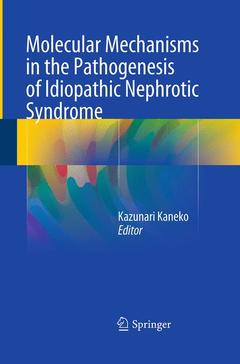Molecular Mechanisms in the Pathogenesis of Idiopathic Nephrotic Syndrome, 1st ed. 2016
Coordonnateur : Kaneko Kazunari

This comprehensive book reviews our current state of knowledge about the pathogenesis of idiopathic nephrotic syndrome (INS), which comprises a heterogeneous group of diseases with distinct histological characteristics, such as minimal-change nephrotic syndrome (MCNS), focal segmental glomerulosclerosis (FSGS), and idiopathic membranous nephropathy (IMN). As the word ?idiopathic? indicates, the pathogenesis of INS remains unclear. Historically, T-cell dysfunction has been thought to play an important part in the pathogenesis of MCNS, while circulating vascular permeabilities have been believed to induce proteinuria in FSGS. The book further describes recent advances in molecular biology, which have allowed us to speculate on the interactions between visceral glomerular epithelial cells (podocytes) and the relative significance of several molecules in the pathogenesis of INS, such as reactive oxygen species, nuclear factor-kappa B, CD80, angiopoietin-like 4, cardiotrophin-like cytokine-1, and M-type phospholipase A2 receptor. The normally rapid pace of scientific progress occasionally devolves into a state of chaos, and the pathogenetic research on INS is one such case. This volume will help researchers and scientists to collaborate, share resources, and expedite the design of protocols to evaluate the putative factors.
Part 1. Introduction.- 1. History of Research on Pathogenesis of Idiopathic Nephrotic Syndrome.- Part 2. Minimal-change nephrotic syndrome (MCNS).- 2. Hemopexin in Minimal Change Nephrotic Syndrome.- 3. Angiopoietin-like-4 (Angptl4) in MCNS.- 4. Co-stimulatory molecule CD80 (B7.1) in MCNS.- 5. Energy and Mammalian target of rapamycin complex 1 (mTORC1) in minimal change nephrotic syndrome.- 6. The role of c-mip in the pathogenesis of Minimal Change Nephrotic Syndrome.- 7. REGULATORY T-CELLS AND OXIDATIVE STRESS IN MINIMAL CHANGE NEPHROPATHY.- 8. CYTOKINES AS ACTIVE FACTORS IN MINIMAL CHANGE NEPHROTIC SYNDROME.- Part 3. Focal segmental glomerulosclerosis (FSGS).- 9. Soluble urokinase-type plasminogen activator receptor (suPAR) in Focal Segmental Glomerulosclerosis.- 10. CYTOKINES AS ACTIVE FACTORS IN FOCAL SEGMENTAL GLOMERULOSCLEROSIS.- Part 4. Idiopathic Membranous Nephropathy (IMN).- 11. M-Type Phospholipase A2 Receptor (PLA2R) and Thrombospondin Type-1 Domain-Containing 7A (THSD7A) in Membranous Nephropathy.- 12. Cationic Bovine Serum Albumin as Cause of Membranous Nephropathy: From Mice to Men.- Part 5. Treatment in Idiopathic Nephrotic Syndrome.- 13. Podocytes as a direct target of drugs used in Idiopathic Nephrotic Syndrome.
Brings together all of the latest research by top researchers on molecular mechanisms in the pathogenesis of INS
Represents one putative pathogenetic molecule in each chapter and reviews its role, mechanism, and prospects as a biomaker or for new drugs
Provides valuable reading for physicians, pediatricians, nephrologists, and individuals researching nephrotic syndrome
Date de parution : 08-2016
Ouvrage de 240 p.
15.5x23.5 cm
Disponible chez l'éditeur (délai d'approvisionnement : 15 jours).
Prix indicatif 126,59 €
Ajouter au panierDate de parution : 11-2015
Ouvrage de 240 p.
15.5x23.5 cm
Disponible chez l'éditeur (délai d'approvisionnement : 15 jours).
Prix indicatif 105,49 €
Ajouter au panier


